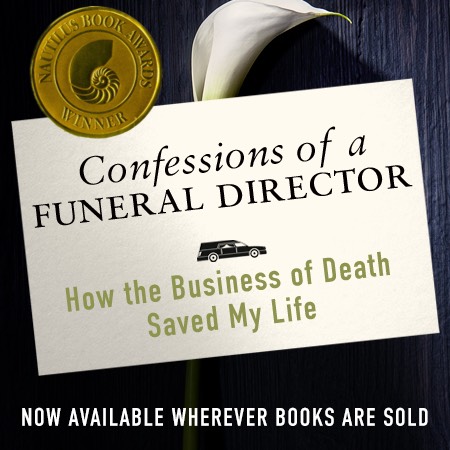Caleb Wilde
(218 comments, 980 posts)
Posts by Caleb Wilde
To my 19-year-old self: I want to let you know, I’ve become a failure
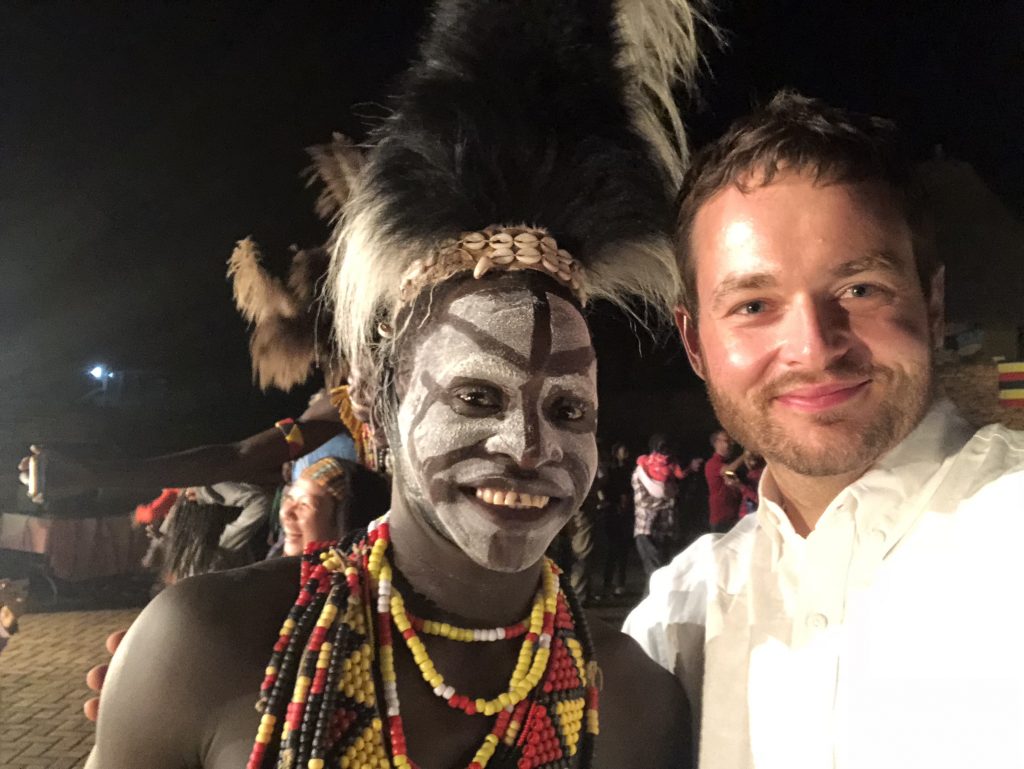
The guy on the right is me (for clarification). Also for clarification, this guy isn’t a witch doctor. He’s a dancer for the Ndere Cultural Centre.
A PREFACE: I’m in Uganda with World Vision for the next week doing what might be called “social awareness tourism” (I’ll be writing about what I’m doing for the next week, which might get so boring you’ll be begging me to talk about dead people again. Actually, it won’t be boring. I’m here to tell the stories of the locals who are fighting against child sacrifice. The last time I was in Africa was when I was a 19-year-old missionary trekking medical supplies to indigenous villages and handing out Bibles to people groups that had never been introduced to Christianity. Being back on this continent has brought back memories of my 19-year-old self, and I feel the need to explain to him why I’ve failed him. This is a vulnerable piece, so be nice to me.
To my 19-year-old self,
Let’s get this out of the way. I’m not the person you wanted to become. I’m the person you fought so hard to avoid. I know that you’re a stoic idealist (even though I don’t think we realized it at that age), and I know that you like truth (that part hasn’t changed), so I’m gonna get the hardest part out of the way, and this is going to upset you, but here it goes: You aren’t a missionary, or a humanitarian worker, or a pastor.
You work at the funeral home. It’s a tough job that’s taken a lot out of you. You’ve stayed because you’re able to hear the pain of those you work for and lift them up without diminishing their grief. You think about quitting your job at least once a week, but the hard and difficult stories you see have unleashed a part of you that feels at home in the dark spaces.
Here’s the other part that’s going to be tough to swallow: you don’t go to church any longer. I want you to know there’s a good reason you don’t go. And you should also know that I’ll go back if I’m ready, although it likely won’t be to a church you’d approve. I’m more comfortable with silence now. I’m okay with not having answers to all the questions. I found that God’s children are all over the place. And as much as I want to explain all that, as the great poet once said, “It’s the climb. Yeah ea, yeah ea!”
There are some other small things you probably wouldn’t like: you curse, you let your shoe fetish get the better of you, your hairline is receding and – this probably won’t come as a surprise because you ALWAYS questioned this part of your upbringing – you are an ally to the LGBTQ community. Oh, and those six-pack abs never came in, and you’re still not entirely comfortable in your skin.
BUT, that girl you have a crush on? You married her. And that book you were working on? That 150,000-word book? That one sucked. The one you did get published isn’t a best seller, but it won an award. You have an absolutely beautiful son and you’re a damn good father.
I’m writing all this because I am here in Africa again, and I thought I’d let you know so you can be just a little proud of what I’ve become. I’m not here as a missionary, I’m here as a writer. I’m not telling my truth, or the story I think I should be telling them. I’m here to witness them, not witness to them. I’m here to listen and tell their story
I’m sorry we didn’t turn out the way we anticipated. Keep going, forgive yourself, believe that God loves you (there’s going to be a decade where you won’t), and smile more, because your story hasn’t followed the path you’d hoped, I think you’ll find it’s ended up someplace even better.
As a Funeral Director, Here Are 10 Questions You Should Never Be Afraid to Ask Me
One. Can I ask you a weird question?
THERE ARE NO WEIRD QUESTIONS. Dying, death and death care are clouded in a sense of mystery. After our loved ones die, they’re whisked away by the hospital staff, or by a funeral director. Once at the funeral home, the body is either transformed through embalming or cremation. That whole period — from death to disposition — offers all too many questions for the deceased’s loved one. This is why there are no weird questions. Ask us anything and everything and we’ll give you an honest answer.
Two. Can I help?
Firstly, this is YOUR loved one. It’s not ours. One of my sayings I like to tell families to reaffirm that idea is this: “you’ve loved and cared for them up to this point, so don’t stop now.” There are some things we can’t let you help with, like embalming, but there are a hundred other things like dressing your loved one, helping in the transfer, doing the hair, makeup and even riding in the hearse.
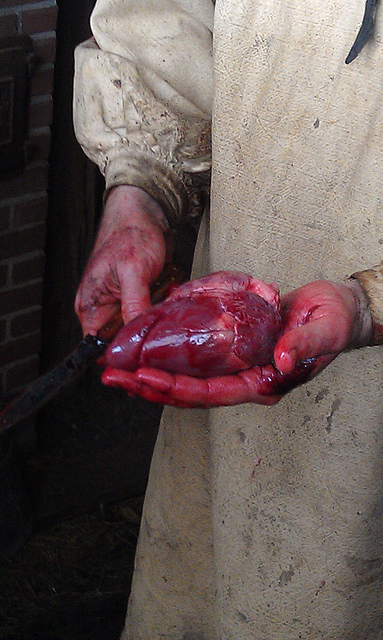
URL: https://www.flickr.com/people/timomcd/
Title: Pig’s Heart
Year: 2011
Source: Flickr
Three. Can you fix …?
If you’re having a viewing, it’s always good to pre-view your loved one before the public viewing. If mom’s hair is off, if the clothing isn’t on correctly, if it isn’t your mother lying in the casket … you need to ask us to fix that problem.
Four. Can I see your General Price List?
The General Price List shows the itemized list of our prices so you can make an intelligent financial decision when shopping for a funeral home. In fact, the Federal Trade Commissions requires us to give you this list. The FTC states, “You must give the General Price List to anyone who asks, in person, about funeral goods, funeral services, or the prices of such goods or services.”
Five. Can I have a little longer with my loved one?
OMG, yes. And any funeral director who responds otherwise should be fired. Remember, this is your loved one, not ours.
Six. Can you rub my back?
Embalmers generally massage the arms, legs, and face of the deceased to help with fluid distribution. So, we are able to massage. And even though your body might be strained from grief, we’re probably gonna say “no” to this question. Sorry. You’ve got be dead to get that service.
Seven. Can I watch …?
This is a valid question. Again, most funeral directors will say “no” if you ask to watch an embalming, but just about anything else is on the table. Many crematories will even let you hit the “start” button.
Eight. How can I save money?
Funeral directors should have YOUR best interest in mind, not their own. If you want an inexpensive funeral, the funeral director knows how to cut corners better than anyone. (And, just as free advice, this question should be asked BEFORE your loved one passes. Call around. Ask funeral homes for their GPL. And find one that you’re both comfortable working with, AND, is inexpensive. You could save a couple thousand just by shopping around.)
Nine. “Can you cut out the heart of my husband and have it cremated separately so I can put the heart ashes in a cremation locket? I want the cremation locket of his heart next to my heart.”
This was an actual question a widow asked a buddy funeral director. He said “no.”
Ten. Can you help me with …?
If we got into this work for anything than other than service we’re doing it entirely wrong. It’s not bad if we make money, but the main reason we’ve maintain a place in society is because we’ve helped you in your hardest moments. Good funeral directors are service oriented, and the best ones are both service-oriented and intelligently helpful.
*****
If you like my writing, consider buying my 2017 Nautilus Book Award Gold Winner, Confession of a Funeral Director (click the image to go to the Amazon page):
Honest and Practical Talk about Wanting a Traditional Funeral When You Don’t Have Any Money
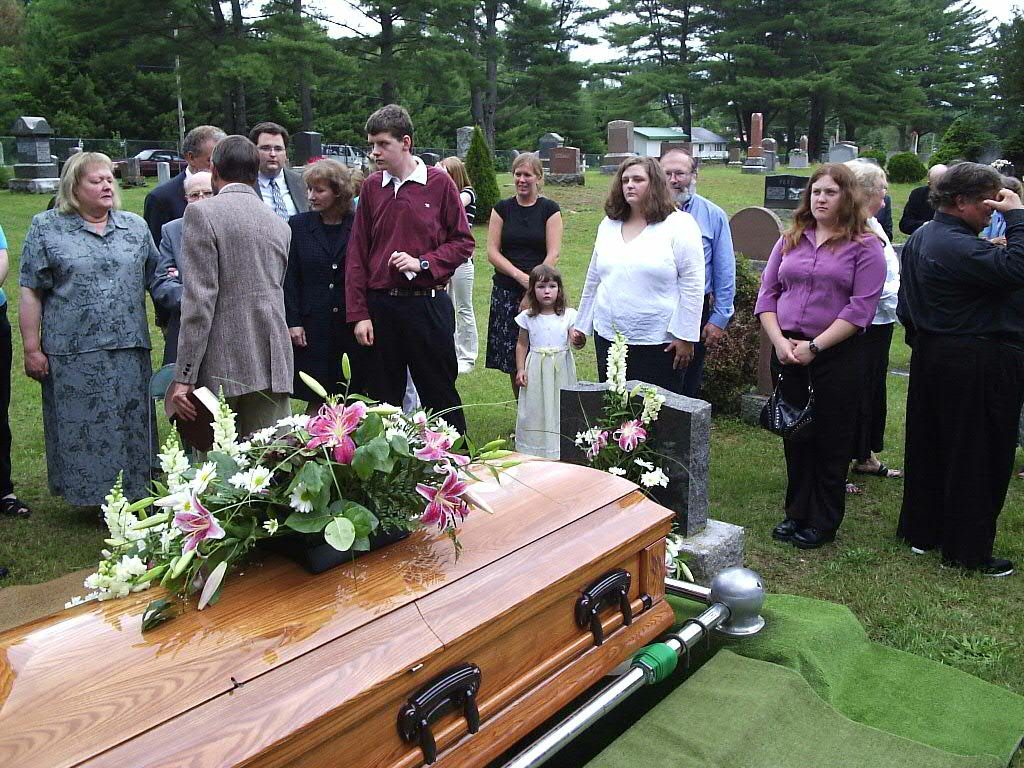
The biggest problem that I have with the funeral industry is that we’ve made honor a commodity.
Let me explain by taking you on a short imaginary journey where unicorns exist and Fred Rogers is still alive. Unfortunately, in this imaginary world, your Dad dies suddenly at 60 years of age. Your dad worked hard his entire life, was generally overlooked by his peers, and was never given the respect and honor you knew he deserved. For his funeral, you want to make things right. You want to give him an honorable and respectful send-off. And you want the works … embalming, a nice casket, a nice cemetery lot, upscale flowers, a big funeral luncheon with all your dad’s favorite foods … all of it.
One problem. You don’t have any money. What do you do?
I know, I know … you’re saying this isn’t you because in this imaginary world you’re choosing cremation, or sky burial, or a Viking Funeral. Maybe you plan to lay your body at the altar of science.
Back to the real world: This “making death a commodity” is a long-held tension, dating back thousands of years. The plainness of the Jewish funeral rites is a reaction to this tension. The rich were having opulent funerals while those less wealthy would “sell the farm” to give their family something on the same level as the rich. In the Babylonia Talmud, it’s written:
Formerly, (it was customary) to bring out the rich for burial on a dargesh (a tall, stately bed, ornamented and covered with rich coverlets) and the poor on a plain bier, and the poor felt shamed; they instituted … that all should be brought out on a plain bier, out of deference for the poor …
Today, things have flipped. The rich and those with higher education have a much higher cremation (per data collected by CANA).
Based on my experience, this is how I’d explain that data: those that have been disrespected in life often want to be respected in death. If a family or people group have been subjected to socioeconomic, political, legal, cultural, or institutional oppression, there’s a desire to give in death what wasn’t given in life: honor. Honor in death means many things, but here in American, it has too often meant a “traditional funeral” and burial. For many Americans who have felt dishonored, cremation — the less expensive option — is often seen as another layer of disrespect.
And when a family sees a traditional funeral and burial as THE ONLY WAY TO HONOR THEIR DEAD, therein lies the problem that’s been created by the American Funeral Industry.
Because …
If you want a full traditional burial, the cemetery lot, cemetery opening, the vault, and the casket (the vault and casket can be bought from third-party suppliers, or bought from the funeral home) are going to start at around $4,000 (this number varies by location … cemeteries cost more the closer you get to a city, so it could be more or less depending on where you live and where you die). If the funeral home charged NOTHING for their own professional service, there are still thousands of dollars in play just for plot purchase, plot opening, and the vault that 95% of cemeteries require.
I look forward to the day when that $4,000 can be cut in half with green cemeteries that don’t require a vault, use a less expensive and bio-degradable casket, and — in some circumstances — can have the grave dug by the families themselves. But until the day when there’s a green cemetery close to everyone’s home (because proximity is always a major concern), that $4,000 for a traditional funeral is a starting point even before the funeral director is involved.
On top of that estimated 4K, funeral homes — like ours — charge for our work, time, facilities, etc. Our funeral home charges approximately $3,000 for our “services” start to finish, which includes embalming, dressing and cosmetology, logistical and form filing work, the use of our cars and equipment, use of our facilities, the funeral directing itself, backrubs, vodka, dragon rides, and anything and everything else you want us to do (if you nix embalming, it’s less, obvs, much less if you nix the vodka).
Other funeral homes — especially the ones with exorbitant debt — can charge double or triple what we charge.
Let me throw some thoughts at you …
The fact is that many funeral homes are too expensive.
Any many funeral directors have a complicit and implicit bias towards poverty and those who find themselves a part of it.
But funeral homes aren’t banks. We don’t finance funerals. We don’t offer loans.
Most funeral homes require payment (or proof of payment, i.e. an insurance policy or irrevocable burial reserve) upfront because we have been beat one too many times.
If the price is a major concern, shop around. A funeral at our funeral home costs thousands less than our competitors. One phone call could be the deal-maker or deal-breaker.
Funeral homes do give pro-bono funerals, but those funerals are rarely for people who lack funds, and they rarely cover the cemetery fees. Pro-bono funerals are usually for tragic and complicated deaths, such as infants and children.
GoFundMe hardly ever works (and the funeral home won’t accept “I started a GoFundMe for grammy’s funeral” as proof of payment).
Asking churches for money can only do so much.
Trying to find an uncle or aunt or grandparent or distant relative to finance the funeral IS THE BEST OPTION.
But here’s the real honest talk. You ready?
A traditional funeral and burial is only ONE WAY to honor the deceased.
Honoring the deceased is about the community they’ve created.
It’s about that community coming together and expressing their love.
Honor doesn’t need ornate caskets, pretty hearses, and large gravestones.
Honor doesn’t need a funeral with flashy clothing in a flashy building with flashy flowers.
Honor is about love. And whenever love is shown in celebration of that person’s life, you’ve honored your loved one.
*****
If you like my writing, consider buying my 2017 Nautilus Book Award Gold Winner, Confession of a Funeral Director (click the image to go to the Amazon page):
Death Fact: Part 2
Viewer Discretion Advised: Working around death, it’s easy for me to forget that what I view as an interesting historical fact is considered grotesque by most accounts. This little fact might fit under that “grotesque” category. In fact, my mother said it made her want to barf. So, fair warning. Don’t proceed IF the morbid piques your gag reflex instead of your curiosity.

This is a real thing (as you can see from the picture below). And, yes, it’s rather morbid.
Here’s a little excerpt from Atlason Sigurður’s “Stave for Necropants” for more explanation:
If you want to make your own necropants (literally; nábrók), you have to get permission from a living man to use his skin after his death.
After he has been buried, you must dig up his body and flay the skin of the corpse in one piece from the waist down. As soon as you step into the pants, they will stick to your own skin. A coin must be stolen from a poor widow and placed in the scrotum along with the magical sign, nábrókarstafur, written on a piece of paper. Consequently, the coin will draw money into the scrotum so that it will never be empty, as long as the original coin is not removed. To ensure salvation, the owner has to convince someone else to take ownership of the pants and step into each leg as soon as he gets out of it. The necropants will thus keep the money-gathering nature for generations.
Imagine that Bob believes that necropants will bring him wealth. Imagine that Bob asks his buddy Rich, who’s dying from dysentery, for his skin.
Rich: “Hey, Bob. I know you think necropants will make you rich, but let’s stop and think this through. Have you ever seen a scrotum produce money?”
Bob: “I haven’t, but this is going to work. I know it’s going to work.”
Rich: “Okay, I see that you’re convinced of this, so you can have my skin after I waste away. But, if it does work, I want you to give half of the money to my family.”
Bob: “It’s going to work.”
*****
BEAR WITH ME AS I TURN TO MY PHILOSOPHICAL DARK SIDE: What I find interesting is how necropants must have seemed like an entirely logical way to gain wealth to whoever used them. I mean, you’d really have to believe in something to wear the skin of your friend and stick money in his scrotum. It was logical because they believed in an unseen world that controls and dictates the seen world.
To us, this practice is absolutely absurd, and rightfully so. But, we still do absurd things to gain wealth. Like playing the lottery. Or, maybe a better one-to-one example is giving money to a televangelist who promises, “God will increase your gift by 10 fold!”
And before we judge Bob, or the person who gives money to televangelists, it’s important to remember that we all throw money at things that don’t make sense. Bottled water for example. How is bottled water a multi-billion dollar industry? Because our culture values convenience above and beyond most other considerations, including the environment. Or, leather. We wear the skin of dead animals because we think it’s fashionable, protective, etc., when we know that there are better, more cost-effective, more durable materials than leather (that examples a little too close to home).
In some weird way, we all wear necropants. So, yes. Necropants are weird. But we all do weird things with our money. And most of us do weird things to try and get money.

Story of My Death Episode 13 – The story of Kat’s suicide attempt
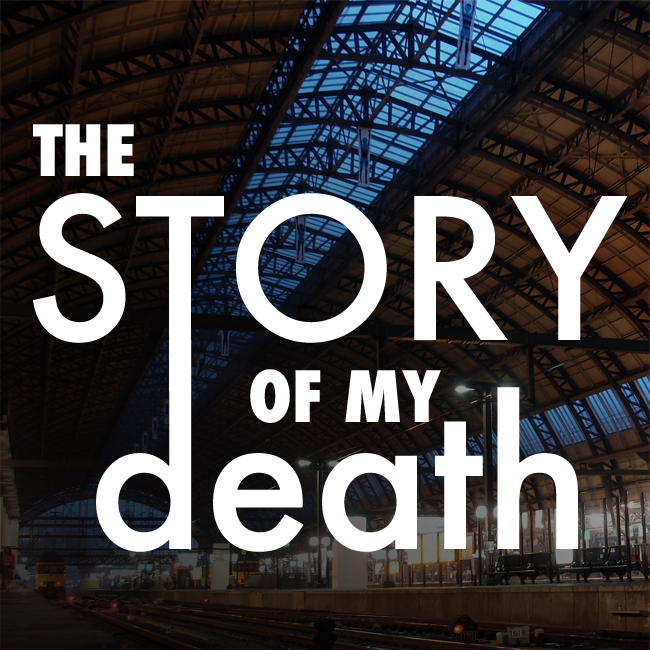
Fair warning, there are curse words in this episode. And the content of this episode is not suitable for Daniel Tiger, Teletubbies or children. This is the story of a suicide attempt. If this content triggers you, I kindly ask you to wait for the next episode.
I will say that while this episode is heavy, it’s also redemptive; and while the story is heavy, it’s also deeply human.
If you’d like to listen to the episode in iTunes, click HERE.
Or, you can listen using the media player below:
